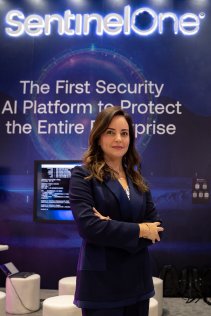
Veronica Martin caught up with Meriam El Ouazzani, Regional Director, Middle East, Turkey & Africa at SentinelOne, during GITEX Global to discuss the products they are showcasing, the latest technology and cybersecurity trends in the Middle East and the significant advantages that AI brings to cybersecurity.
Can you tell our readers about SentinelOne’s participation at GITEX 2023? What products are you showcasing and what are your expectations from the event?
GITEX is a great platform for us where we get to meet our global customers and show our technology. We have a team of experts here to share with our customers the latest market trends in cybersecurity, but also our technology stack as we have developed from a company that was completely focused on EDR into one that is doing XDR today. Some of the demonstrations that we have that are active today are regarding our Singularity XDR.
We’re looking at a platform that allows you to have the full visibility on your cybersecurity and automation as well for response. Whenever we are talking about the cybersecurity for SentinelOne or the XDR, we always look at the protection part, the detection and the response. It’s very important for our customers to have the best technology that is protecting them, their endpoints, cloud and identity. It’s also crucial to provide them with a mechanism by which they can do a detection and an automated response. We are also demonstrating other technologies about identity. We have acquired a company called Attivo Networks, where we built a complete portfolio that covers three elements. The first is the identity active directory portion that allows us to do the assessment of the active directory in a proper head check.
The second part is the identity security and the third is deception that allows us to have a deception base and point protection. We’re also going to be showcasing our Singularity Cloud storage security, which allows our customers to secure their cloud storage, whether it’s private or public. We’re also going to be showing AI for cybersecurity that allows customers to manage their company in a much easier and simpler way.
What are the latest technology and cybersecurity trends in the Middle East?
We are seeing many trends from cloud to AI, but AI is being undermined quite a lot from our customers and partners. We’ve been investing in the AI and leading in the domain, so we understand that one of the challenges that customers are having today is related to skills, as we’re not finding that people are developing those skills quite fast, and we know this is a big issue for our customers. Even if you’re giving them the right tools and they develop the right processes, we’re left with this element of people that is not covered, so we have introduced the Purple AI, which is a simple language model that people can use to query, correlate the data and then take an action based on that data. Because the engineers have to do it with a very simple language (similar to ChatGPT), it allows us to bridge the skills our customers are struggling with, giving the SOC analysts the ability to take the right actions on time and in an efficient way.
From your company’s perspective, what are the key technologies and trends that you’re seeing that will drive your innovation and product roadmap for the next 12 months?
We are investing more on XDR and AI, which will help in the endpoint detection, response and protection. We are also developing technologies through acquisition and are looking at elements like the identity that we’re putting a lot of emphasis on. AI is simplifying IT for the good guys, but also the attacks for the bad guys who are using it to develop and push further their attacks. We’re also looking to simplify IT, so our customers can focus on developing their own AI strategy, lead with our technology, be able to bridge that skills’ gap and deliver the right cybersecurity inside their organisations.
Can you tell us about the significant advantages that AI brings to cybersecurity – leveraging behavioural and generative AI in cybersecurity?
Regarding AI, we see in the market a lot of endpoint systems that are not using it. Instead, they are using a heavy human interaction with the system analysis. AI facilitates how the cybersecurity is managed, how the data is correlated, because in cybersecurity we have a lot of data that needs to be correlated and actions that need to be taken based on the correlation that has been done. We’re looking at AI to simplify what we are doing today and manage the cybersecurity for our customers.
We also use AI to analyse the context of the attack, so we are no longer looking at security or endpoint security as a malware. All the malware and attacks we see are coming with new signatures. If we base our technology on systems that would only identify if the attack is known or not, then we know what SentinelOne has done and how it was built from the beginning is on a technology that allows us to use AI to analyse the trends and patterns that we see. Rather than identifying a malware being identified and recognized, it allows us to identify the day one of the attacks and this allows us to block more attacks that are coming from outside. It also allows us to understand and refresh the database that we have that is connected to the effect in the market.





